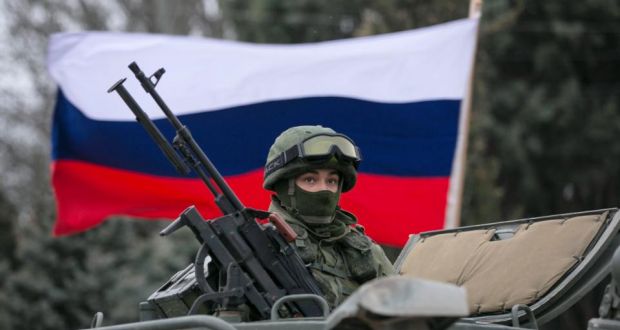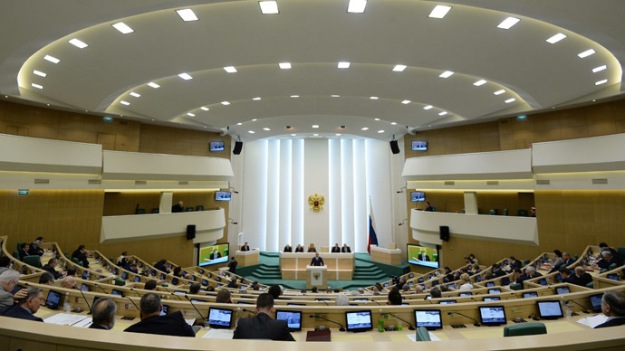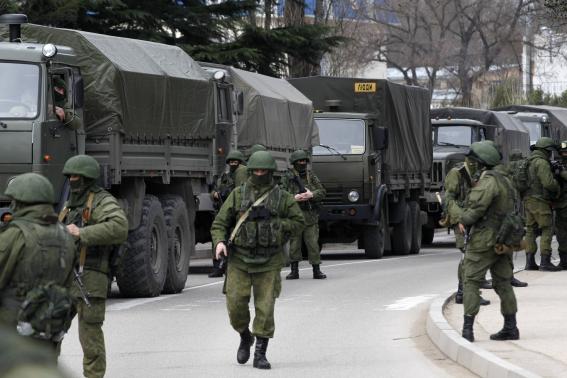
A Russian flag behind an armed servicemen on top of a Russian army vehicle outside a Ukrainian border guard post in the Crimean town of Balaclava today
Ukraine has asked Nato to look at all possible ways to help it protect its territorial integrity, foreign minister Sergei Deshchiritsya said today.
The minister said he had held talks with officials from the United States and the European Union and then asked Nato for help after what Ukraine’s prime minister described as Russian aggression.
A request had been made to Nato to “look at using all possibilities for protecting the territorial integrity and sovereignty of Ukraine, the Ukrainian people and nuclear facilities on Ukrainian territory,” he said.
The United Nations security council was meeting tonight after Russia announced plans to send armed forces into the autonomous Crimea region of the former Soviet republic, council delegations said.
A diplomat from Luxembourg, president of the 15-nation council this month, said the meeting was convened at the request of the British government.
The council met yesterday to discuss the crisis in Ukraine’s Crimea region but took no formal action, as expected. The meeting highlighted the deep divisions between the United States and other Western nations and Russia, which has a major Black Sea naval base in the Crimea.
At yesterday’s session, Ukraine accused Russia of illegal military incursions onto Ukrainian territory, while US and European delegations warned Moscow to withdraw any new military forces deployed in neighboring Ukraine. Russia, however, said any military movements by Russian forces there were in compliance with its agreement with Kiev on maintaining its naval base there.
Russia is a veto-wielding permanent member of the security council and, therefore, able to block any actions proposed by its members.
The move comes as Russian president Vladimir Putin wrested control of the Ukrainian Black Sea region of Crimea from Kiev, citing a threat to Russian citizens and servicemen of the Russian Black Sea fleet based there.
Mr Putin asked the upper house of parliament to approve sending armed forces to the Ukrainian territory, which has a majority ethnic Russian population.
Crimea had already begun to slip from Kiev’s control with closure of the main airport and deployment of pro-Russian guards at key buildings.
Mr Putin’s statement, and remarks from a pro-Russian leader installed in Crimea this week, effectively confirmed what most people in the region had assumed: that military units who had seized control in the past two days were indeed Russian military.
Ukraine accused Russia of sending thousands of extra troops to Crimea, largely hostile to the Kiev government which emerged from the overthrow of president Viktor Yanukovich last weekend.
It placed its military in the area on high alert. After Mr Yanukovich’s overthrow, Crimea quickly became the focus of a crisis bearing perils for the entire region.
Mr Putin turned to parliament after a day of events viewed with deep concern in Europe and the United States. British foreign minister William Hague said he had spoken to Russian counterpart Sergei Lavrov and called for a ‘de-escalation’ of tensions. US president Barack Obama said any Russian intervention in Ukraine would carry costs for Moscow.
“In connection with the extraordinary situation in Ukraine, the threat to the lives of citizens of the Russian Federation, our compatriots, and the personnel of the armed forces of the Russian Federation…I submit a proposal on using the armed forces of the Russian Federation on the territory of Ukraine until the normalisation of the socio-political situation in the that country,” Mr Putin said in a statement to parliament.
Crimea’s regional premier had appealed to Mr Putin for help ensuring “peace and tranquillity”.
The newly appointed pro-Russian leader of Crimea, Sergei Aksyonov said servicemen of the Russian Black Sea Fleet, based in Crimea under a lease, had been deployed to guard important buildings and that he was taking the region’s military, police and other security services under personal control.
Masked, armed men in camouflage uniform bearing no insignia took up positions today outside Crimea’s parliament in the local capital Simferopol. Similar groups seized the assembly itself on Thursday and have also taken airports and the main broadcasting building in Crimea.
 Armoured vehicles and military-style trucks are on the region’s roads and Russian military helicopters flew over its territory yesterday.
Armoured vehicles and military-style trucks are on the region’s roads and Russian military helicopters flew over its territory yesterday.
Earlier Ukraine had vowed not to respond militarily to Russian “provocation”.
Russia’s foreign ministry claimed earlier that “unknown armed people sent from Kiev” tried to seize Crimea’s interior minister last night.
The alleged attack was repelled by “self-defence groups” but caused casualties, the ministry said, calling it a sign of the “desire of familiar political circles in Kiev to destabilise the situation on the peninsula.”
No Crimean officials or media outlets mentioned the alleged attack before the Russian ministry’s statement, however.
Ukraine’s defence minister Ihor Tenyukh said today that Russia had brought 6,000 additional personnel into Crimea and that Ukraine’s own military were on high alert in the region.
“We will not take any steps that could provoke armed confrontation. All responsibility for escalation of the conflict lies personally with the leadership of the Russian Federation,” said Ukraine’s premier Arseniy Yatsenyuk.
“The inappropriate presence of Russian armed forces in (Crimea) is nothing other than a provocation,” said Mr Yatsenyuk, whose government took power after a revolution ousted president Viktor Yanukovich.
“We demand that the Russian government and authorities withdraw their forces and return to their bases. Stop provoking civil and military confrontation in Ukraine.”
Much of Crimea’s ethnic-Russian population is calling for Kremlin intervention in the region, because they fear their rights will be abused by a new Ukraine government that is supported by ultra-nationalists. The government insists it is moderate and will protect all Ukrainian citizens.
Parliament in Kiev has called on the US and Britain to safeguard its borders and independence under the terms to the 1994 Budapest Memorandum, by which Kiev was given security guarantees in return for relinquishing its Soviet-era nuclear arsenal.
Britain’s foreign secretary William Hague is expected to visit Kiev tomorrow.
“We are now deeply concerned by reports of military movements taken by the Russian Federation inside of Ukraine,” US president Barack Obama said yesterday, adding that any violation of Ukraine’s sovereignty and territorial integrity would be “deeply destabilising”.
“The United States will stand with the international community in affirming that there will be costs for any military intervention in Ukraine,” Mr Obama warned.

US president Barack Obama said last night that th e United States stands with the international community ‘in affirming that there will be costs for any military intervention in Ukraine
Ukrainian officials believe Russia is trying to provoke armed conflict in Crimea to justify full occupation and annexation of a region that has was under Russian control for centuries.
They recall how Moscow claimed that it sent troops into Georgia in 2008 to defend Russian citizens there. Now Russia recognises two Georgian regions as independent states and has thousands of soldiers based in each one, blocking Tbilisi’s ambition of moving closer to Nato membership.
Russia’s parliament intends to discuss simplifying the procedure by which people in Crimea could obtain Russian passports. Thousands of people in the region already hold Russian citizenship.




















